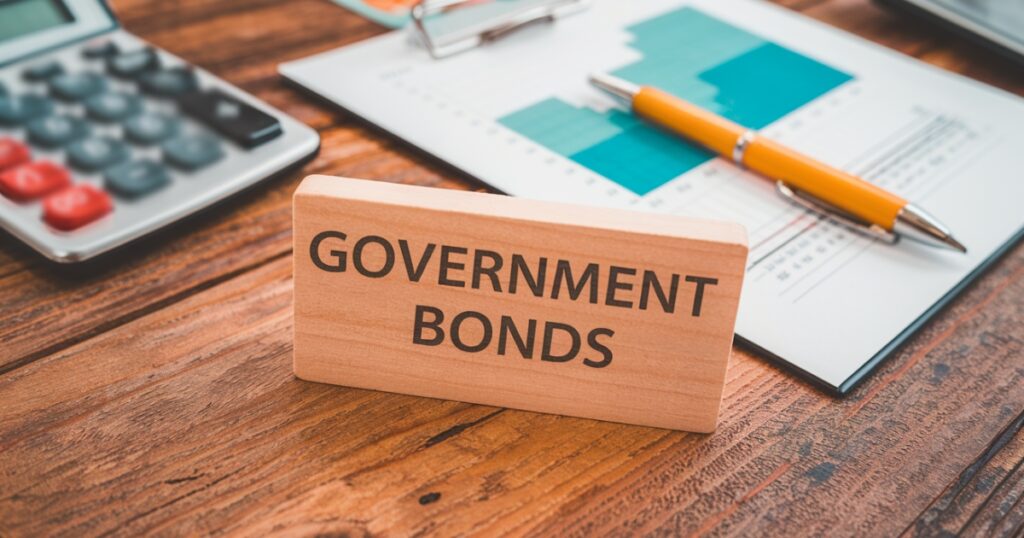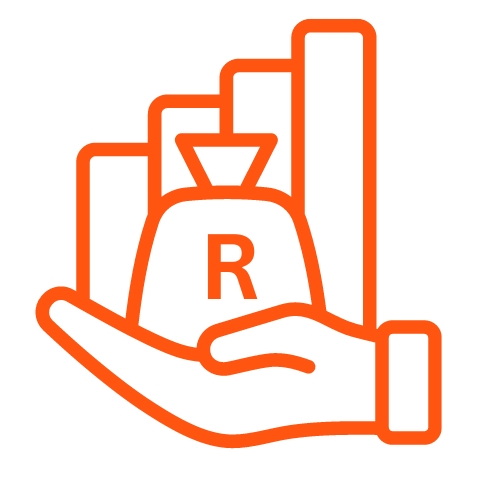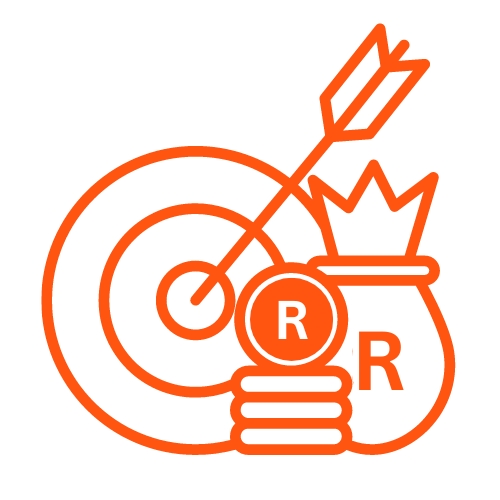
Investing in government bonds in South Africa is a reliable way to secure steady returns while contributing to the country’s economic growth. These bonds are backed by the government, offering a safe investment option that is particularly appealing to risk-averse investors. If you’re aiming to diversify your portfolio or earn consistent income through interest payments, it’s important to understand how to purchase government bonds and what to consider before investing.
Key Takeaways
- Various Buying Options: You can invest in South African government bonds through the Treasury, stockbrokers, Exchange-Traded Funds (ETFs), or unit trusts.
- Low-Risk Returns: Government bonds provide stable, low-risk income, with the principal amount guaranteed at maturity.
- Retail Bond Accessibility: RSA Retail Savings Bonds are easy to purchase with a low minimum investment. However, they cannot be resold before maturity.
About Arcadia Finance
With Arcadia Finance, securing your loan is straightforward. Select from 19 approved lenders, all compliant with South Africa’s National Credit Regulator, without facing any application fees. Experience a seamless process and reliable options suited to your financial goals.
What is a Government Bond?
A government bond is a debt instrument issued by the South African government to raise funds for its expenditures and obligations. When you invest in these bonds, you are effectively lending money to the government in exchange for earning interest on your investment. Government bonds are generally considered low-risk assets due to the backing of the national government.
How Do Bonds Work?
When you purchase a government bond, you are lending a specified amount to the government for a predetermined period. In return, you receive regular interest payments, known as coupon payments, throughout the bond’s term. At the bond’s maturity, you are repaid the initial amount of capital you invested. The yield on government bonds varies based on the length of the investment period, with longer terms typically offering higher yields. The standard bond is often referred to as a “vanilla bond.” Additionally, the government issues inflation-linked bonds, where the interest payments are adjusted according to the inflation rate, providing protection against inflation rather than a fixed rate.
Why Invest in Government Bonds?
Investors often choose government bonds for their reliable income stream, marked by regular, predetermined payments. For those with lower risk tolerance, these bonds are a strategic option to counter inflation and ensure stable returns. Holding bonds until maturity guarantees that investors will receive their principal back, preserving their capital. Additionally, during periods of market volatility, bonds can act as a safeguard against losses, providing valuable diversification from the stock market.
Discover how the strength of the Rand affects your investment in government bonds, providing a deeper understanding of market dynamics and the economic factors that influence bond prices and yields.

Types of Government Bonds and How to Buy Them in South Africa
South Africa’s government bonds are designed to give investors stable returns while helping the state fund its spending. The main types available to individual and institutional investors are:
RSA Retail Savings Bonds
- Fixed Rate Bonds: These pay a guaranteed, fixed interest rate over two, three, or five years. Interest is paid every six months.
- Inflation-Linked Bonds: These protect your money against rising prices, with interest payments adjusted according to South Africa’s inflation rate.
Best for: Individual investors looking for a safe, accessible entry point with a low minimum investment of R1,000.
Conventional Government Bonds (JSE-listed)
Issued by the National Treasury and traded on the Bond Exchange of the Johannesburg Stock Exchange (JSE), these bonds are available to both retail and institutional investors through stockbrokers. They typically pay fixed coupons and can be sold before maturity.
Best for: Investors who want liquidity and flexibility, and are comfortable using a stockbroker.
Inflation-Linked Bonds (ILBs)
Apart from the retail version, South Africa issues institutional-grade inflation-linked bonds, where both the principal and interest payments are adjusted according to inflation. These are actively traded on the JSE.
Best for: Investors seeking long-term protection from inflation while keeping capital relatively safe.
Government Bond ETFs
Bond Exchange-Traded Funds, such as the Satrix SA Bond ETF or Ashburton ILBI ETF, track a basket of South African government bonds. These products are traded like shares on the JSE, and income is usually reinvested into the fund.
Best for: Investors who prefer a diversified, low-cost option without having to buy individual bonds directly.
| Buying Method | How It Works | Minimum Investment | Liquidity | Best For |
|---|---|---|---|---|
| Stockbroker (JSE Bond Exchange) | Buy and sell government bonds directly on the JSE through a licensed stockbroker. Prices may trade above or below face value. | Usually higher (varies by broker) | High – bonds can be sold before maturity | Investors who want flexibility and are comfortable with brokerage platforms |
| Bond Unit Trusts | A fund managed by professionals that invests in a mix of government and corporate bonds. Accessible via linked investment service providers (LISPs). | Often from R500 – R1 000 | High – units can be redeemed fairly easily | Beginner investors seeking diversification and professional management |
| Bond ETFs (Exchange-Traded Funds) | JSE-listed funds that track a basket of government bonds (e.g. Satrix SA Bond ETF, Ashburton ILBI ETF). Income often reinvested. | Cost of 1 ETF share (can be under R100) | High – can be bought/sold like shares | Cost-conscious investors looking for diversification and easy trading |
| RSA Retail Savings Bonds | Direct investment with the National Treasury (fixed rate or inflation-linked). Terms of 2, 3, or 5 years. Cannot be resold before maturity. | R1 000 | Low – must hold until maturity | Conservative investors wanting a simple, safe entry with guaranteed capital return |
Government bonds offer stability and security, making them an attractive choice for conservative investors. If you’re looking for a well-rounded approach, consider exploring the Best Way To Invest Money In South Africa to diversify your portfolio and maximise returns.
Considerations Before Buying

Bond Yields and Maturities
Before investing in government bonds, it’s essential to grasp how bond yields and maturities function. The bond yield is the annual return on your investment, expressed as a percentage of the bond’s current market price. This yield can fluctuate due to changes in interest rates, economic conditions, and the bond’s credit quality. Maturity, on the other hand, refers to the time until the bond’s principal amount is repaid. Bonds vary in maturity, from short-term bonds, which mature within a few years, to long-term bonds with maturities extending over several decades. Generally, longer-term bonds offer higher yields to compensate for the increased risk of the extended investment period. However, they also expose you to greater interest rate risk, which can impact the bond’s price if rates rise.

Assessing Your Investment Goals
Aligning your bond investments with your broader financial objectives is crucial. Determine if you’re seeking a stable income source, a conservative investment to preserve your capital, or a way to diversify your investment portfolio. Government bonds are appealing for their stability and predictability. Consider your investment horizon and how bonds fit into your overall strategy. For instance, if you’re planning for retirement, long-term bonds might be suitable, as they provide a steady income stream over time. Conversely, if you require liquidity in the near term, shorter-term bonds or those with more frequent coupon payments may be more appropriate.

Risks Associated with Government Bonds
While government bonds are generally seen as safe investments, they are not without risks. Interest rate risk is a major concern. As interest rates rise, the prices of existing bonds usually fall, which can affect their market value if sold before maturity. Inflation risk is another factor; if inflation rises significantly, the real purchasing power of the bond’s returns may decrease. Although South African government bonds are backed by the government, offering a layer of security, a small amount of credit risk remains. This risk is relatively low but should be considered, particularly in times of economic uncertainty.

Step-by-Step Guide to Buying Government Bonds in South Africa

Step 1: Choose the Type of Bond
Your first step is to decide which kind of government bond best suits your financial objectives. A Fixed Rate Retail Savings Bond pays a guaranteed interest rate for the full investment term, making it ideal if you want certainty. An Inflation-Linked Bond adjusts interest payments in line with the Consumer Price Index (CPI), ensuring your money keeps its value even when the cost of living rises. There are also other market-based government bonds with varying terms and returns, generally accessed through financial institutions.

Step 2: Decide Where to Buy
Once you know the type of bond you want, you must choose where to purchase it. The National Treasury, via the RSA Retail Savings Bonds programme, is the most direct and trusted option for individuals. You can also invest through banks and financial institutions, which may bundle bonds within broader savings or investment products. For those who prefer convenience, online platforms allow you to apply digitally, sometimes offering useful tools to compare different options.

Step 3: Complete the Application
The application process is simple and requires basic documentation. You will usually need proof of identification, proof of residence, and banking details. Applications can be completed online via the official RSA Retail Savings Bonds website, or in person at selected bank branches. The process has been designed to be accessible, even for first-time investors.

Step 4: Make Your Payment
After approval, you will be asked to fund your investment. Payment options include electronic funds transfer (EFT), debit order, or cash deposits at participating banks. Once your payment is processed, you will receive a confirmation of investment, detailing your bond type, amount, and maturity date.

Step 5: Manage Your Investment
With your bond in place, the focus shifts to management. Interest payments are deposited into your nominated bank account at regular intervals, depending on the bond chosen. When the bond matures, you can either withdraw your capital and interest or choose to reinvest in a new bond. Keeping track of these timelines helps ensure your investment strategy stays on course.
Practical Example: Investing R10 000 in a Fixed-Rate Bond
Suppose you invest R10 000 in a 5-year Fixed Rate Retail Savings Bond at an interest rate of 9% per year.
- Each year, you would earn R900 in interest, paid into your bank account.
- Over 5 years, this totals R4,500 in interest.
- At maturity, you would receive your original R10 000 capital plus the interest earned, amounting to R14,500 in total.
If instead you chose an Inflation-Linked Bond, your interest rate would adjust annually in line with inflation, which may result in higher or lower returns depending on economic conditions.
Before deciding to purchase government bonds, get a solid grounding in the basics of sovereign debt. This article provides a comprehensive overview, helping you understand the risks and benefits associated with this type of investment.

Advantages and Disadvantages of Buying Government Bonds
Benefits
- Safety and Stability: Government bonds, particularly those issued by stable governments like South Africa’s, are considered among the safest investments. They are backed by the full faith and credit of the government, which means the risk of default is low. This makes them an appealing choice for conservative investors.
- Steady Income Stream: Government bonds typically provide regular interest payments, known as coupon payments. These payments offer a consistent income stream, which can be especially beneficial for retirees or those seeking reliable cash flow.
- Diversification: Including government bonds in an investment portfolio can help diversify assets and lower overall risk. They often have a low correlation with equities and other asset classes, which can help balance the volatility of other investments.
- Tax Benefits: In some cases, interest income from government bonds may be tax-exempt or receive favourable tax treatment, enhancing the after-tax return on your investment.
- Liquidity: Government bonds are generally highly liquid, meaning they can be bought and sold easily in the market. This provides investors with the flexibility to access their funds when needed.
- Predictable Returns: With fixed interest rates and maturity dates, government bonds offer predictable returns. Investors know exactly how much they will receive in interest payments and the principal amount at maturity.
Drawbacks
- Lower Returns Compared to Other Investments: Government bonds often offer lower returns than shares or corporate bonds, which can be a drawback for investors seeking higher yields. In a low-interest-rate environment, the returns on government bonds may be modest.
- Inflation Risk: Inflation can reduce the purchasing power of the interest payments and principal repayment. If inflation rates rise significantly, the real value of returns from government bonds can decline, making them less appealing.
- Interest Rate Risk: Bond prices are inversely related to interest rates. When interest rates rise, existing bonds with lower rates may decrease in value. This can be a concern for investors who need to sell their bonds before maturity.
- Opportunity Cost: Investing in government bonds means committing capital to a low-risk, low-return asset, which can result in missed opportunities in potentially higher-return investments, such as shares or property.
- Credit Risk: Although government bonds are generally safe, there is always a slight risk of default, particularly in emerging markets or during economic uncertainty. It’s important to assess the credit rating and economic stability of the issuing government.
- Currency Risk: For international investors, there is an additional risk related to currency fluctuations. If the South African Rand weakens against the investor’s home currency, the value of bond returns may be negatively affected.
Conclusion
Investing in government bonds in South Africa offers a secure and reliable method to grow your wealth while supporting the country’s financial stability. Options include direct purchases through the National Treasury, as well as more accessible routes like retail savings bonds, bond ETFs, and unit trusts. Each method provides distinct advantages, such as potential for higher yields, ease of liquidity, or straightforward entry points. By understanding the various types of government bonds and their features, you can make informed decisions that align with your financial goals and risk tolerance.
Frequently Asked Questions
A government bond is a financial instrument issued by the South African government to raise funds for various expenditures. When you purchase a government bond, you are essentially lending money to the government. In return, you receive regular interest payments and the return of your principal amount at maturity. Government bonds are considered low-risk investments due to their backing by the national government.
Government bonds work by allowing investors to lend money to the government for a specified period. In exchange, investors receive periodic interest payments, known as coupon payments, and get their original investment back when the bond matures. The yield of a bond can vary depending on its term, with longer-term bonds generally offering higher yields. Some bonds are inflation-linked, meaning their interest payments adjust based on inflation rates.
Government bonds are attractive for their steady income and low risk. They provide regular interest payments and the assurance of getting back your principal at maturity. They are a good option for investors seeking stability, particularly during market volatility, and can help diversify your investment portfolio by offering a safe alternative to equities.
In South Africa, government bonds can be purchased through several channels. You can buy directly from the National Treasury during primary issuances, though this often requires a substantial investment. Alternatively, you can acquire bonds on the secondary market through a stockbroker, invest in bond ETFs or unit trusts, or purchase RSA retail savings bonds from the Post Office or online.
RSA retail savings bonds are a direct way for individuals to invest in South African government bonds with a minimum investment of R1,000. These bonds offer fixed terms of two, three, or five years and provide yields linked to government bond rates. They can be purchased at the Post Office or online, but they cannot be resold on the secondary market, meaning investors must hold them until maturity.
Fast, uncomplicated, and trustworthy loan comparisons
At Arcadia Finance, you can compare loan offers from multiple lenders with no obligation and free of charge. Get a clear overview of your options and choose the best deal for you.
Fill out our form today to easily compare interest rates from 19 banks and find the right loan for you.

